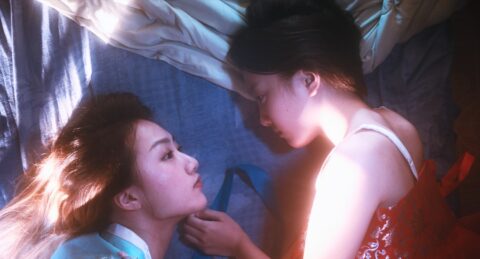Cerulean. Cyan. Turquoise. Midnight blues, sky blues, deep blues, soft blues, light blues. Colourist Yov Moor, working with the tangible and diffused images presented by DOP Hao Jiayue, certainly helps the Chinese film A Song Sung Blue (Zihan Geng, 2023) live up to the name of its title. Excellently utilising digital photography to create a world upon itself, this is a film awash in the most melancholy and suggestive of all colours.
Seemingly named after one of Neil Diamond’s most evocative songs, itself inspired by Mozart’s Piano Concerto 21 in C Major, Geng’s debut film is all about creating a sustained emotion of quiet yearning, depicting one girl’s coming-of-age in a masculine, complicated world. A studied film, filled with unsaid glances, suggestive close-ups, and elliptical editing techniques, it gets great mileage out of its painterly frames, but its emotional core feels buried under a surfeit of style.
15-year-old Liu Xian (Zhou Meijun) is a meek and withdrawn girl, yet under her unassuming demeanour is a young rebel, wishing to push back against the boundaries of gender essentialism. When singing in the girl’s choir, for example, she is immediately drawn to the boy’s uniform, only to be told she cannot wear it. She lives a fairly comfortable life with her doctor mother (Liang Jin), who works long hours, leaving her plenty of time to explore the ins and outs of the hospital, visiting every wing apart from the morgue.
When her mother takes a job in Africa — the film is iffy on the specifics, but we assume it’s somewhere French-speaking — Liu Xian is forced to live with her estranged father (Liang Long), who owns a photography studio. Set ten years ago, this photography studio still sees decent business, with her father developing a strong, flirtatious rapport with the female customers. He’s less kind to his own daughter, calling her by the nickname “smelly”.
Yet this photography studio is the perfect setting for a coming-of-age film about femininity, as it allows Liu Xian to explore the way that people are pictured affects our perception of them. This feeling comes to the fore in her relationship with the older, beautiful Jin Mingmei (Huang Ziqi), who acts as both an aspirational model and a warning of the dangers to come. Locked into various dangerous relationships with men — the kinds who go to fancy Russian restaurants and order borscht and seafood — she gives Liu Xian a better education in the pitfalls of womanhood than any school.
A Song Sung Blue tracks their complex relationship, oftentimes framing pivotal information through a window or a crack in a wall, presenting a beautiful reverie — especially as the bright reds of Mingmei’s costumes threaten to add some spice to Liu Xian’s otherwise suffused world — that’s rich in implication, but lacking in devastation. Sometimes blue isn’t the warmest colour.
Redmond is the editor-in-chief of Journey Into Cinema.
